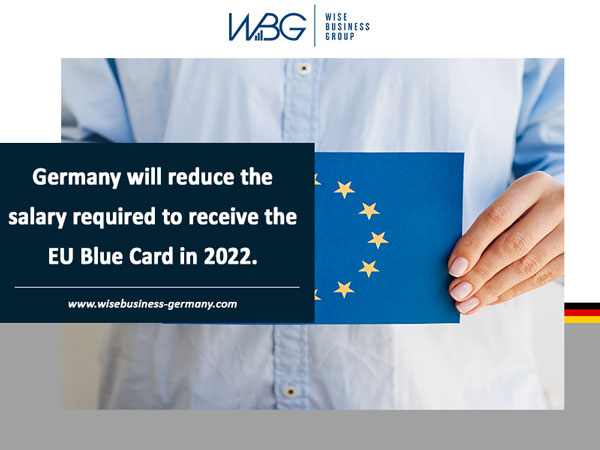EU Blue Card in 2022
Is it possible to set up a company in Germany and run it from abroad?
June 2, 2022Everything you need to know about the EU Blue Card!
June 16, 2022Germany will reduce the salary required to receive the EU Blue Card in 2022.
The Federal Office for Migration and Refugees (BAMF) has announced that the minimum annual gross salary for receiving an EU Blue Card in Germany has been reduced by 0.7% since January 1, 2022.
It means that eligible foreigners intending to work with the EU Blue Card in Germany can do so with a lower salary offer than before.
In this article of Wise Business Group, we explain the salary requirements and general conditions for receiving the EU Blue Card in Germany in 2022.
The minimum salary required to receive a German Blue Card in 2022
In its updated guidelines for receiving the EU Blue Card in Germany in 2022, the Federal Office for Migration and Refugees has announced:
The minimum annual gross salary required to obtain such a residence permit in Germany is € 56,400.
For jobs in mathematics, information technology (IT), natural sciences, engineering, and human medicine (excluding dentistry), the minimum annual gross salary required to receive a German Blue Card in 2022 is € 43,992. This amount is lower than last year.
EU Blue Card
The EU Blue Card is a document that allows the holder to move from one of the non-EU countries to the EU and work there for several years. This type of residence permit is granted only to professionals who have a university degree and a job offer with the required minimum salary.
The minimum salary and requirements for receiving a German Blue Card usually change annually.
Salary required to receive a German Blue Card
In 2021, the minimum wage required to receive a German Blue Card was € 56,800 for jobs without labor shortages in the country and € 44,304 for jobs with labor shortages. This amount has been higher than in 2020.
In 2020, the minimum wage required to receive a German Blue Card was € 55,200 for jobs without labor shortages and € 44,304 for labor shortages.
Reduction of the minimum salary required to receive an EU Blue Card in Germany
Germany’s decision to reduce the minimum wage required to receive a Blue Card in 2022 comes as the European Union seeks to make it easier for eligible foreigners to obtain this type of residence permit.
Members of the European Parliament agreed in September last year (2021) to amend the EU Blue Card laws and facilitate the entry of highly skilled citizens from outside the EU to reduce labor shortages in key sectors across the EU.
Members of parliament have also agreed that employees can receive a German Blue Card with only a six-month contract. Previously, having a twelve-month contract was mandatory.
Recruitment of skilled labor in Germany
The EU Blue Card is not the only way to recruit skilled labor in Germany.
As of March 1, 2020, Germany has issued visas to recruit qualified professionals and trainees from third countries under the new Skilled Immigration Act. According to the law, Germany wants to fill those jobs that face a shortage of skilled labor from Germany or the European Union.
In the first year of implementing the law, from March 1 to December 31, 2020, German authorities managed to issue 30,200 visas for qualified professionals and trainees from third countries, despite a pandemic.
Salary and requirements for receiving the EU Blue Card in 2022 in Germany
The EU Blue Card is a residence permit issued to qualified professionals from outside the EU to come and work in the EU. To obtain it, you must meet the minimum salary requirement.
Last year, Germany took steps to facilitate the receipt of the Blue Card to make up for its labor shortage. The minimum salary for receiving the German Blue Card in 2022 has reached 56,400 euros, after a decrease of 0.7%.
This minimum salary is € 43,992 for jobs with a shortage of labor in Germany, including jobs related to mathematics, information technology, engineering, natural sciences, and human medicine.
To receive a German Blue Card, you must have a university degree, a job offer with the required minimum salary, and a six-month contract.
Services for receiving a blue card and obtaining a residence permit in Germany
If you want to get a residence permit in Germany for yourself and your family by receiving an EU Blue Card, you can get help from WBG Advisors. Wise Business Group consultants with many years of experience obtaining Blue Cards and German residence permits will be by your side along this path.



